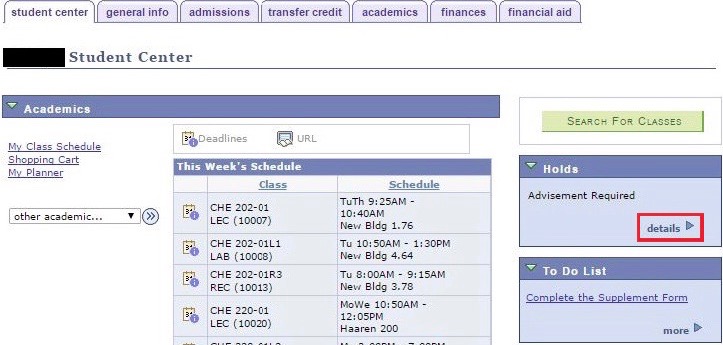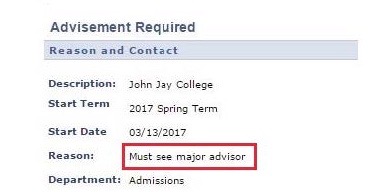Human Services & Community Justice Major Resources
Upon graduation from the program, students will find that they are well prepared to enter advanced degree programs specializing in direct human services such as counseling, community psychology, social work, and public health. They will also have a strong foundation in advocacy work such as community labor, human and political rights, policy analysis, urban affairs and public administration.
Here you will find:
- Key information about your major
- How and when to meet with your major advisor
- Planning tools that will help you track your progress in the major
- Ways to explore career opportunities related to the HSCJ major
Take a few moments to look at the information below. It will help you plan effectively and avoid surprises during your studies at John Jay. Please visit the Department of Counseling & Human Service's website for information, resources, and opportunities!
HSCJ Requirements
You are responsible for the major requirements that were in effect when you declared the major. To confirm the requirements you should be following, go to the Undergraduate Bulletin for that academic year. For example, if you declare the Human Services and Community Justice major in Fall 2018 or Spring 2019, you would click on the 2018-2019 Undergraduate Bulletin. If you declared the major and then left the College for more than one full semester, you’re responsible for the major requirements in effect when you return, if they have changed.
Below, find the Undergraduate Bulletin that was in effect when you declared the major.
Each of the following HSCJ courses can count toward your major requirements and toward your General Education requirements:
World Cultures: ANT 101 (Foundation Course option), ANT 208
U.S. Experience in its Diversity: CSL 260, LLS 241, SOC 213
Individual & Society: PSY 101 (Foundation Course option), SOC 101 (Foundation Course option)
Learning from the Past: AFR 204
300 Level Justice: ANT 330, AFR 315, AFR 317, AFR 319, AFR 320, LLS 322, LLS 325
Note: The Human Services and Community Justice major is interdisciplinary and therefore allows you to take courses in a wide range of departments. While it’s acceptable to use major courses in order to meet General Education requirements, we encourage you to seek out interesting ways to meet requirements that don’t necessarily involve overlapping courses.
Major Advising
Human Services and Community Justice major advising is being done remotely in Spring 2025. Students can email Prof. Taylor (bltaylor@jjay.cuny.edu) to request an appointment or see her appointment schedule via her personal availability link (https://jjay-cuny.campus.eab.com/pal/XTri-e1ZDy). Prof. Taylor is happy to arrange Zoom appointments, since that method is the easiest way to share information. She is also open to telephone access to Zoom appointments, if desired.
HSCJ Major Advisor:
Prof. Betty Taylor
8.65.20/NB
212-237-8140
Once you have declared the HSCJ major, Prof. Taylor will email you several times a year with detailed information about the courses available in the upcoming semester. You will also be signed up for the departmental ListServ to keep you in touch with field education opportunities, winter and summer courses, and other departmental events.
During Summer session (June 2 - August 25) 2025, HSCJ students who would like advising can email Prof. Taylor (bltaylor@jjay.cuny.edu) to request an appointment or see her appointment schedule via her personal availability link (https://jjay-cuny.campus.eab.com/pal/XTri-e1ZDy). Prof. Taylor is happy to arrange Zoom appointments, since that method is the easiest way to share information. She is also open to telephone access to Zoom appointments, if desired.
HSCJ Major Advisor:
Prof. Betty Taylor
8.65.20/NB
212-237-8140
Sophomores with 45-59 credits may have a hold on their registration. The hold will be removed when they have a major advising appointment with Prof. Taylor (bltaylor@jjay.cuny.edu). This discussion will encourage wise planning and allow students to ask any questions they may have about the major. How do you know if you have a major hold? Go to CUNYfirst and complete the following steps:
- Check the Holds box of your CUNYfirst Student Center. If "Advisement Required" appears, click on “details.”

- Click on “Advisement Required.”

- See which type of advisement you need. If you must see a major advisor, then make a major advising appointment following the steps preferred by this department.

.
Plan Ahead: Graduate on Time
To stay on track in the HSCJ major, keep the following guidelines in mind:
- Complete your math foundation requirement in your first year. The HSCJ major requires MAT 108 or higher as a prerequisite.
- Complete your other foundational course for the major as soon as possible by taking one of the following courses: ANT 101 or PSY 101 or SOC 101.
- Take CHS 150 as soon as possible, since it provides an introduction and is a prerequisite for many of the courses in the major.
- Look ahead in the major to be aware of any course prerequisites and preferred sequences. For example, here is one recommended sequence for some of the core courses: CHS 150 + AFR 145 → CHS 230→ AFR 227 + CHS 235 → CHS 310
- The Department of Counseling and Human Services offers a wide selection of elective courses in Category A, Category B, and Category C. You must select one course in each category. Discuss your options with your major advisor.
- The HSCJ major requires two field education placements (a total of 300 hours). You will need to sign up one year in advance. Meet with the Field Education Coordinator to discuss placement options.
- DegreeWorks degree audit - Use this online planning tool to track your overall progress toward graduation. You will see which of your general education and major requirements are completed, in progress, or still needed. Refer to the DegreeWorks FAQs to better understand how to use this helpful tool.
- Major Requirement Worksheet - Fill out this printable worksheet to keep track of which major requirements you have completed and which ones you still need.
- Sample Four Year Plan - See an example of how you could complete all your degree requirements (major, general education, electives) and graduate in four years! Remember that this sample plan shows just one possible way to combine your requirements. Transfer students in particular should work with advisors to determine a plan that works best for them.
A General Academic Advisor will confirm what general academic requirements you still need, make suggestions about smart course planning that will help you graduate without delays, discuss your interest in adding a minor or second major, inform you about opportunities such as study abroad, discuss general questions and concerns, and make helpful referrals. Visit the Academic Advisement Center's webpage for more information.
HSCJ and Careers
In contemporary life, where issues of social, racial, gender and economic justice shape the challenges encountered by diverse and underserved communities, there is a growing need for competent and compassionate professionals to work with these populations. Opportunities within the category of "community and social service employment” are expected to be "very favorable" as the number of human services workers are projected to grow “faster than average” for all occupations through 2024 (Bureau of Labor Statistics, 2015).
The rationale for this anticipated job growth is attributed to:
- the need for services to help address problems related to mental illness, poverty, developmental disabilities, substance abuse, domestic violence, child abuse, and other psycho- social-economic issues impacting contemporary society
- the escalating need for childcare, elder home care and senior citizen services
- a documented trend of deinstitutionalization, which leaves many who are chronically ill left to their own devices and in desperate need of community support services
- increasingly flexible sentencing guidelines, which favor alternative programs over prison time. This shift has increased the need for community-based social service treatment programs and human service professionals trained to provide support for these targeted populations
As an HSCJ major, you will:
1. Work towards a career in which employment is steadily increasing.
2. Make a difference in the lives of others and in your community.
3. Find immeasurable joy and satisfaction that comes from this meaningful work.
4. Advocate for society’s most vulnerable and underrepresented.
5. Engage in work that celebrates diversity and difference.
6. Take classes with knowledgeable and supportive faculty.
7. Gain valuable work experience through required internships.
8. Address issues of injustice in prisons and the criminal justice system.
9. Prepare for advanced degrees in social work, counseling, and community service.
10. Transform society toward greater gender, racial, ethnic, and economic equality.
As a Human Services and Community Justice major, you can expect to work with:
Communities
- Foster an appreciation for diverse human systems
- Carry out community-based approaches to justice, advocacy, leadership, policy making, and administration
Children and families
- Ensure that children live in safe homes
- Help parents advocate for resources for their children, such as food stamps or childcare
The elderly
- Help clients stay in their own homes and live under their own care whenever possible
- Coordinate meal deliveries, provide a range of services according to the clients' needs, or help look for residential care facilities
People with disabilities
- Locate rehabilitation services that aid clients
- Work with employers to make a job more accessible to people with disabilities.
- Find personal care services to help clients with daily living activities, such as bathing and making meals
People with addictions
- Locate rehabilitation centers that meet clients' needs
- Find support groups for people who are dependent on alcohol, drugs, gambling, or other substances or behaviors
Veterans
- Help people who have been discharged from the military adjust to civilian life
- Assist with practical needs, such as locating housing, applying skills gained in the military to civilian jobs, and navigating the services available to veterans
People with mental illnesses
- Help clients find the appropriate resources to help them cope with their illness
- Find self-help and support groups to provide clients with an assistance network
- Find personal care services or group housing for those with more severe mental illnesses
Immigrants
- Help clients adjust to living in a new country
- Locate jobs and housing
- Find ESL programs or legal assistance
Formerly incarcerated people
- Find job training or placement programs to help clients reenter society
- Assist in finding housing and beneficial programs
Homeless people
- Help clients meet their basic needs
- Find temporary or permanent housing for clients and locate places, such as soup kitchens, that provide meals
- Locate resources to address other problems that clients may have, such as joblessness.
HSCJ Careers:
Behavioral Management Aide
Case Manager/Worker
Community Organizer/Advocate
Correction Treatment Counselor
Family and Child Advocate
Juvenile and Domestic Violence Counselor
Juvenile Court Liaison
Parole Officer
Pre-Trial Service Officer
Rehabilitation Case Worker
Social and Community Service Manager
Child Welfare Specialist
Public Policy Advocate
Social Work Assistant
Career opportunities with advanced educational training:
Clinical/Counseling Psychologist
Family Therapist
Mental Health Counselor
Social Worker
Services Organizations
Public and Private Child Welfare Agencies
Probation and Parole Offices
Mental Health Clinics
Correctional Facilities
Community Health Centers
Substance Abuse Clinics
Health Centers
Educational Facilities
Criminal Justice Agencies
Social Services Agencies
Business and Industry
Halfway Houses
Hospitals
Residential Treatment Centers
Courts
Senior Centers
Adoption Centers
Day Care Facilities
Group Homes
Hospital and Medical Facilities
John Jay’s Center for Career and Professional Development is a great resource for questions related to job searches, internships, and career preparation. CCPD staff are available to meet individually with students and alumni in L72.00 New Building. To request a 45-minute counseling appointment, log on to John Jay Careers Online. 15-minute drop-in sessions are also available Mon-Fri 9 a.m. - 5 p.m. Stop by in person earlier the same day to schedule a drop-in session.
Other helpful resources:
National Organization for Human Services
Ethical Standards for Human Services Professionals
Council for Standards in Human Service Education